In
Past events 2022
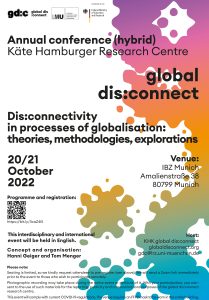 Dis:connectivity in processes of globalisation: theories, methodologies, explorations
Dis:connectivity in processes of globalisation: theories, methodologies, explorations
gd:c annual conference (hybrid), 20-21 Oct 22
The first annual conference of the global dis:connect research centre aims to rethink our understanding of globalisation processes past and present. Global connectivity, which seemed unassailable just 15 years ago, is increasingly in turmoil. The disruption is both ideational, with the rise of anti-globalism and chauvinist nationalism as influential political currents, as well as material, as evidenced in protectionist curbs on global trade, the increasing prevalence of border walls, and global supply chains floundering due to pandemic and war. Talk of de-globalisation has become ubiquitous. This conference takes the current moment to ask whether we might not need a more sophisticated understanding of globalisation, both historical and contemporary. The participants will present new theories, methodologies and case studies to ground a new approach to globalisation — an approach that we denote as dis:connectivity — that notes how globalisation processes have always been characterised by a dynamic and co-constitutive relationship of connection and disconnection. Friction, absence, interruptions and detours are as integral to globalisation as are entanglement, exchange and connection. Since the rise of global history, global art history and global theatre history, scholars have arguably focused on questions of increasing connectivity. Already in 2017, the historian Jeremy Adelman warned of the blind spots of such a one-sided approach.[1] For global art history, Monica Juneja has recently pointed out the meaning of dis:connections in ‘world making’.[2] Overall, however, scholars have really just begun to think about what such a different approach to researching globalisation processes might look like theoretically, methodologically and thematically.[3]
As a research centre founded precisely to advance this research agenda, global dis:connect is delighted to host this annual conference, titled Dis:connectivity in processes of globalisation: theories, methodologies, explorations. We invite everyone to explore what theories, methodologies and cases might be best suited to research dis:connectivity. By focusing on theories and methodologies, as well as diverse case studies, this interdisciplinary and international conference aims to ground further study in this emerging field.
The conference will survey the range of dis:connectivity by bringing together historians, art historians and theatre scholars, reflecting the interdisciplinarity required to capture dis:connectivities in all their facets. Panels are structured around three themes that are particularly pertinent to our research: interruptions, detours, and absences. We will also bring scholars into conversation with creative professionals from the arts, whose approaches offer privileged access to the fluidity and transience that mark many of the phenomena in question.
Confirmed speakers are: Aleksandra Domanović, Valeska Huber, Richard M. Kabiito, Gabriele Klein, Anupama Kundoo, Peter W. Marx, Meha Priyadarshini, Kerstin Schankweiler, Promona Sengupta, and Sujit Sivasundaram.
On the evening of 20 October, the conference will also feature a conversation between the artist Parastou Forouhar and anthropologist Cathrine Bublatzky on The Global Dis:connect: embodiment and positionality as symbols of interruptions, detours and absences in Parastou Forouhar’s art. The conference will close on 21 October with a screening of the short film Atlantiques (Mati Diop, 2009) with a commentary by Fabienne Liptay.
Click HERE to download the flyer and HERE to download the programme.
Language: English
Venue: IBZ, Amalienstr. 38, 80799 Munich.
Conference concept and organisation: Hanni Geiger and Tom Menger.
[1] Jeremy Adelman, ‘What Is Global History Now?’,
Aeon (blog), 2 March 2017, https://aeon.co/essays/is-global-history-still-possible-or-has-it-had-its-moment.
[2] Monica Juneja, ‘Awkward, unstable, creative: Dis:connection as world-making’, opening speech for the Käte Hamburger Research Centre
global dis:connect, Munich, 12 May 2022.
[3] For one example, see: Zoltán Biedermann, ‘(Dis)Connected History and the Multiple Narratives of Global Early Modernity’,
Modern Philology 119, no. 1 (2021): 13–32, https://doi.org/10.1086/714972.
Continue Reading
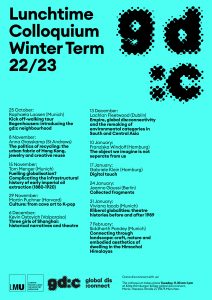 The lunchtime colloquium ("ltc") of the gd:c continues in the winter term. The first session will take place on 25 October. The colloquium takes place on Tuesdays from 11.30 am to 1 pm at the library of the Research Centre.
You can download the programme of the lunchtime colloquium HERE. Continue Reading
The lunchtime colloquium ("ltc") of the gd:c continues in the winter term. The first session will take place on 25 October. The colloquium takes place on Tuesdays from 11.30 am to 1 pm at the library of the Research Centre.
You can download the programme of the lunchtime colloquium HERE. Continue Reading






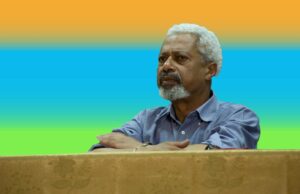 Tom Menger, historian at the Kolleg, has written on German colonial history in East Africa in the work of Nobel laureate Abdulrazak Gurnah. His German language article can be found in today’s Frankfurter Allgemeine Zeitung (
Tom Menger, historian at the Kolleg, has written on German colonial history in East Africa in the work of Nobel laureate Abdulrazak Gurnah. His German language article can be found in today’s Frankfurter Allgemeine Zeitung ( Dis:connectivity in processes of globalisation: theories, methodologies, explorations
gd:c annual conference (hybrid), 20-21 Oct 22
Dis:connectivity in processes of globalisation: theories, methodologies, explorations
gd:c annual conference (hybrid), 20-21 Oct 22
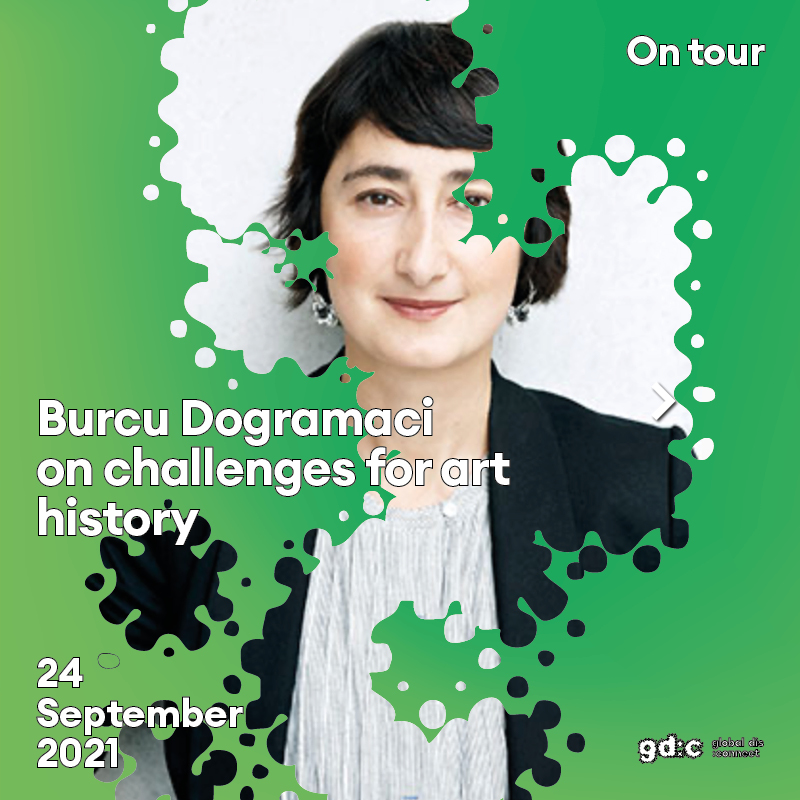 On 24 September, Burcu Dogramaci, art historian and one of the Kolleg’s directors, gave a keynote lecture at the conference “Crossing Borders. Migration and the Visual Arts in Denmark” at the Royal Danish Academy of Science and Letters in Copenhagen. The keynote „Beyond Boundaries: Migration as a Challenge to Art History" discussed the challenge of bringing dislocation and (art)history together.
On 24 September, Burcu Dogramaci, art historian and one of the Kolleg’s directors, gave a keynote lecture at the conference “Crossing Borders. Migration and the Visual Arts in Denmark” at the Royal Danish Academy of Science and Letters in Copenhagen. The keynote „Beyond Boundaries: Migration as a Challenge to Art History" discussed the challenge of bringing dislocation and (art)history together.
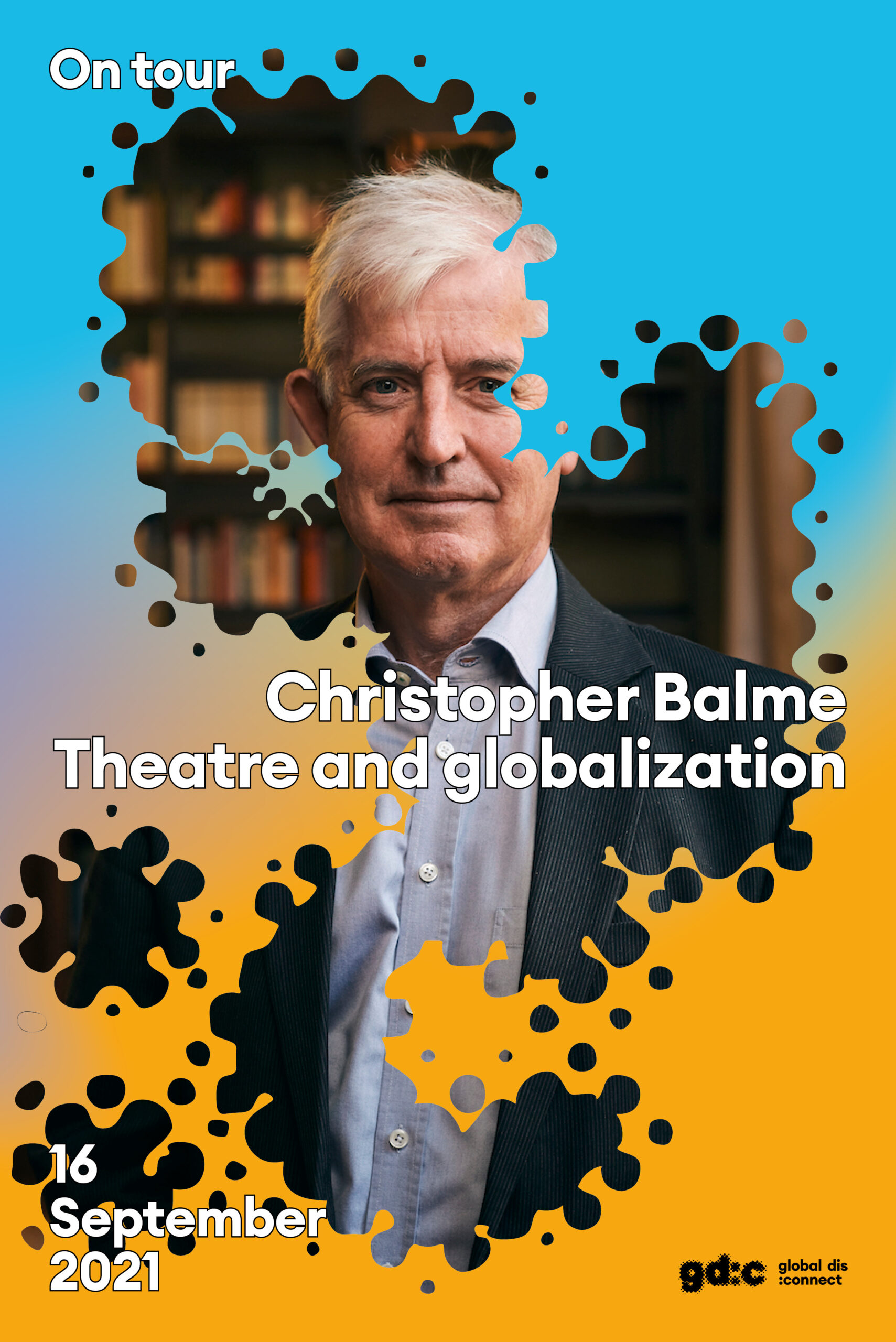 On 16 September, Christopher Balme, theatre scholar and one of the Kolleg’s directors, spoke on “Theatre and globalization” at the Goethe Center, Yeriwan, Armenia.
On 16 September, Christopher Balme, theatre scholar and one of the Kolleg’s directors, spoke on “Theatre and globalization” at the Goethe Center, Yeriwan, Armenia.
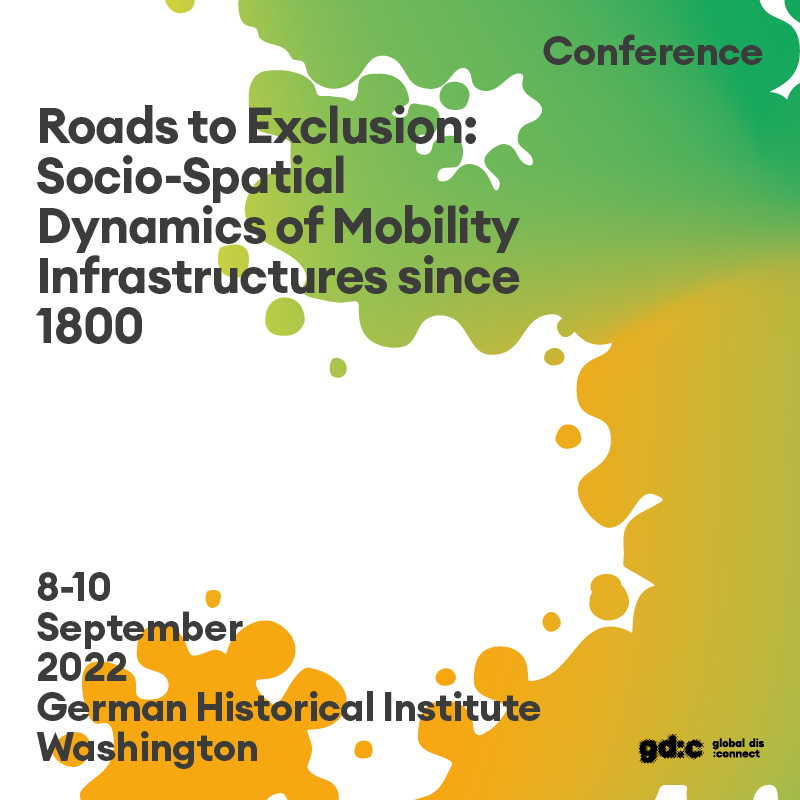 In September 2022, the international conference "Roads to Exclusion: Socio-Spatial Dynamics of Mobility Infrastructures since 1800" will take place at the GHI Washington. It aims to explore the (intended or unintended) dynamics of inclusion and exclusion entailed in mobility infrastructures, ranging from the nineteenth century to the present. The event is jointly organized by the German Historical Institute Washington within the framework of its research area “Histories of Mobilities and Migration” and global dis:connect.
The conference will take place from September 8–10, 2022 and will be hosted by the German Historical Institute in Washington D.C.
Please click
In September 2022, the international conference "Roads to Exclusion: Socio-Spatial Dynamics of Mobility Infrastructures since 1800" will take place at the GHI Washington. It aims to explore the (intended or unintended) dynamics of inclusion and exclusion entailed in mobility infrastructures, ranging from the nineteenth century to the present. The event is jointly organized by the German Historical Institute Washington within the framework of its research area “Histories of Mobilities and Migration” and global dis:connect.
The conference will take place from September 8–10, 2022 and will be hosted by the German Historical Institute in Washington D.C.
Please click 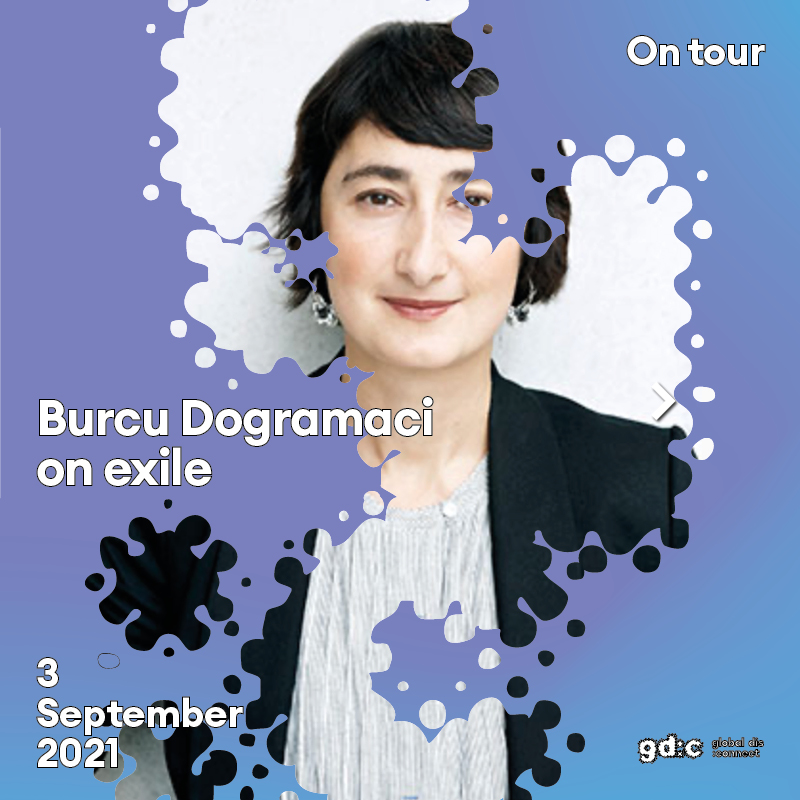 On 3 September, Burcu Dogramaci, art historian and one of the Kolleg’s directors, co-delivered a lecture at the Jahrestagung der Gesellschaft für Exilforschung at the NS-Dokumentationszentrum in Munich. The talk „Erinnerung findet Stadt. Vergegenwärtigung von Exil an den Orten von einst“ looked at dis:connectivity in the context of memory and exile.
On 3 September, Burcu Dogramaci, art historian and one of the Kolleg’s directors, co-delivered a lecture at the Jahrestagung der Gesellschaft für Exilforschung at the NS-Dokumentationszentrum in Munich. The talk „Erinnerung findet Stadt. Vergegenwärtigung von Exil an den Orten von einst“ looked at dis:connectivity in the context of memory and exile.
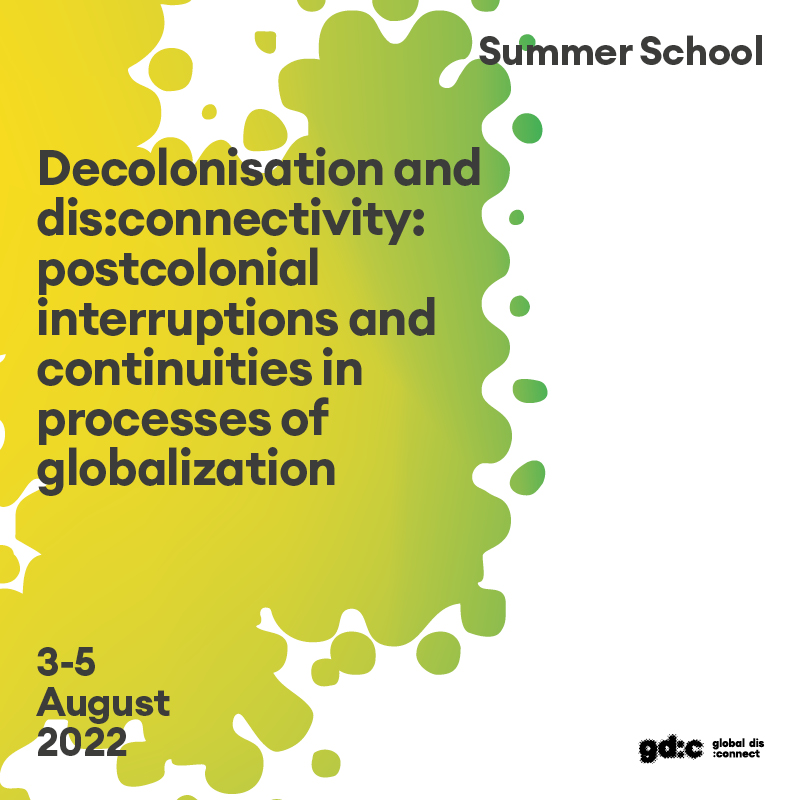 From 3 to 5 August the Käte Hamburger Kolleg global dis:connect will hold its first annual interdisciplinary Summer School at the premises of the center. This year, we will focus on Postcolonial interruptions? Decolonisation and global dis:connectivity and explore how dynamics of decolonisation reordered processes of globalization. We will ask how geopolitical alliances, economic networks, and cultural as well as epistemological bonds were questioned and interrupted permanently or temporarily and at the same time existing connections were reshaped, and new ones appeared. The Centre invites scholars and artists in early stages of their careers to discuss related projects with experts. The courses will foster dialogue between various scholarly approaches and artistic research.
Click
From 3 to 5 August the Käte Hamburger Kolleg global dis:connect will hold its first annual interdisciplinary Summer School at the premises of the center. This year, we will focus on Postcolonial interruptions? Decolonisation and global dis:connectivity and explore how dynamics of decolonisation reordered processes of globalization. We will ask how geopolitical alliances, economic networks, and cultural as well as epistemological bonds were questioned and interrupted permanently or temporarily and at the same time existing connections were reshaped, and new ones appeared. The Centre invites scholars and artists in early stages of their careers to discuss related projects with experts. The courses will foster dialogue between various scholarly approaches and artistic research.
Click 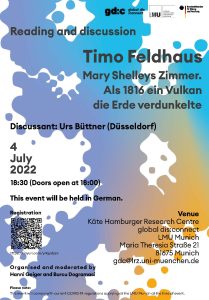 On 4 July, author and journalist Timo Feldhaus presented his book of historical fiction on the eruption of the Mount Tambora volcano (Sumbawa, modern Indonesia) in 1815. The eruption was the most powerful volcanic eruption in recorded history, and it induced climatic, social and artistic repercussions that affected the entire planet for years. Together with Urs Büttner, a scholar of literature, Feldhaus discussed the event as a moment of global rupture that demonstrates the dis:connections between the weather, climate and artistic production. For more information about the book click
On 4 July, author and journalist Timo Feldhaus presented his book of historical fiction on the eruption of the Mount Tambora volcano (Sumbawa, modern Indonesia) in 1815. The eruption was the most powerful volcanic eruption in recorded history, and it induced climatic, social and artistic repercussions that affected the entire planet for years. Together with Urs Büttner, a scholar of literature, Feldhaus discussed the event as a moment of global rupture that demonstrates the dis:connections between the weather, climate and artistic production. For more information about the book click